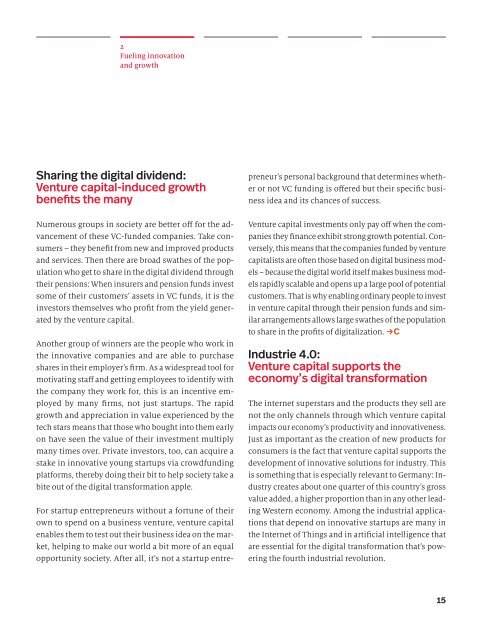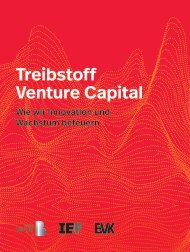Treibstoff Venture Capital (Fuel Venture Capital): Fueling innovation and economic growth
There is a lack of venture capital (VC) in Germany, especially in the growth phase of newly founded companies. As a result, the necessary capital to establish successful companies from innovative business models is lacking. In view of the international competition between technology locations, this lack weakens the innovative power of the European economy and hinders sustainable growth. The new study "Fuel Venture Capital: How we fuel innovation and growth" by Roland Berger, the Internet Economy Foundation (IE.F) and the Bundesverband Deutscher Kapitalbeteiligungsgesellschaften e.V. (Association of German Private Equity Firms). (BVK) analyses existing investment barriers to venture capital and explains how these can be overcome.
There is a lack of venture capital (VC) in Germany, especially in the growth phase of newly founded companies. As a result, the necessary capital to establish successful companies from innovative business models is lacking. In view of the international competition between technology locations, this lack weakens the innovative power of the European economy and hinders sustainable growth. The new study "Fuel Venture Capital: How we fuel innovation and growth" by Roland Berger, the Internet Economy Foundation (IE.F) and the Bundesverband Deutscher Kapitalbeteiligungsgesellschaften e.V. (Association of German Private Equity Firms). (BVK) analyses existing investment barriers to venture capital and explains how these can be overcome.
You also want an ePaper? Increase the reach of your titles
YUMPU automatically turns print PDFs into web optimized ePapers that Google loves.
2<br />
<strong>Fuel</strong>ing <strong>innovation</strong><br />
<strong>and</strong> <strong>growth</strong><br />
Sharing the digital dividend:<br />
<strong>Venture</strong> capital-induced <strong>growth</strong><br />
benefits the many<br />
Numerous groups in society are better off for the advancement<br />
of these VC-funded companies. Take consumers<br />
– they benefit from new <strong>and</strong> improved products<br />
<strong>and</strong> services. Then there are broad swathes of the population<br />
who get to share in the digital dividend through<br />
their pensions: When insurers <strong>and</strong> pension funds invest<br />
some of their customers’ assets in VC funds, it is the<br />
investors themselves who profit from the yield generated<br />
by the venture capital.<br />
Another group of winners are the people who work in<br />
the innovative companies <strong>and</strong> are able to purchase<br />
shares in their employer’s firm. As a widespread tool for<br />
motivating staff <strong>and</strong> getting employees to identify with<br />
the company they work for, this is an incentive employed<br />
by many firms, not just startups. The rapid<br />
<strong>growth</strong> <strong>and</strong> appreciation in value experienced by the<br />
tech stars means that those who bought into them early<br />
on have seen the value of their investment multiply<br />
many times over. Private investors, too, can acquire a<br />
stake in innovative young startups via crowdfunding<br />
platforms, thereby doing their bit to help society take a<br />
bite out of the digital transformation apple.<br />
For startup entrepreneurs without a fortune of their<br />
own to spend on a business venture, venture capital<br />
enables them to test out their business idea on the market,<br />
helping to make our world a bit more of an equal<br />
opportunity society. After all, it’s not a startup entrepreneur’s<br />
personal background that determines whether<br />
or not VC funding is offered but their specific business<br />
idea <strong>and</strong> its chances of success.<br />
<strong>Venture</strong> capital investments only pay off when the companies<br />
they finance exhibit strong <strong>growth</strong> potential. Conversely,<br />
this means that the companies funded by venture<br />
capitalists are often those based on digital business models<br />
– because the digital world itself makes business models<br />
rapidly scalable <strong>and</strong> opens up a large pool of potential<br />
customers. That is why enabling ordinary people to invest<br />
in venture capital through their pension funds <strong>and</strong> similar<br />
arrangements allows large swathes of the population<br />
to share in the profits of digitalization. →C<br />
Industrie 4.0:<br />
<strong>Venture</strong> capital supports the<br />
economy’s digital transformation<br />
The internet superstars <strong>and</strong> the products they sell are<br />
not the only channels through which venture capital<br />
impacts our economy’s productivity <strong>and</strong> innovativeness.<br />
Just as important as the creation of new products for<br />
consumers is the fact that venture capital supports the<br />
development of innovative solutions for industry. This<br />
is something that is especially relevant to Germany: Industry<br />
creates about one quarter of this country’s gross<br />
value added, a higher proportion than in any other leading<br />
Western economy. Among the industrial applications<br />
that depend on innovative startups are many in<br />
the Internet of Things <strong>and</strong> in artificial intelligence that<br />
are essential for the digital transformation that’s powering<br />
the fourth industrial revolution.<br />
15

















